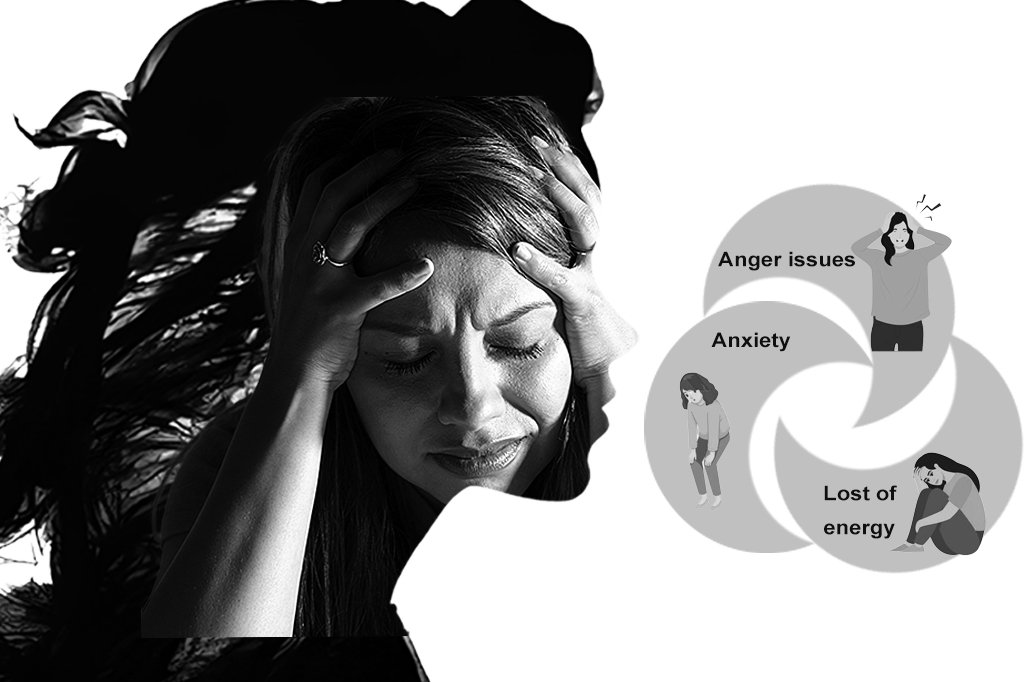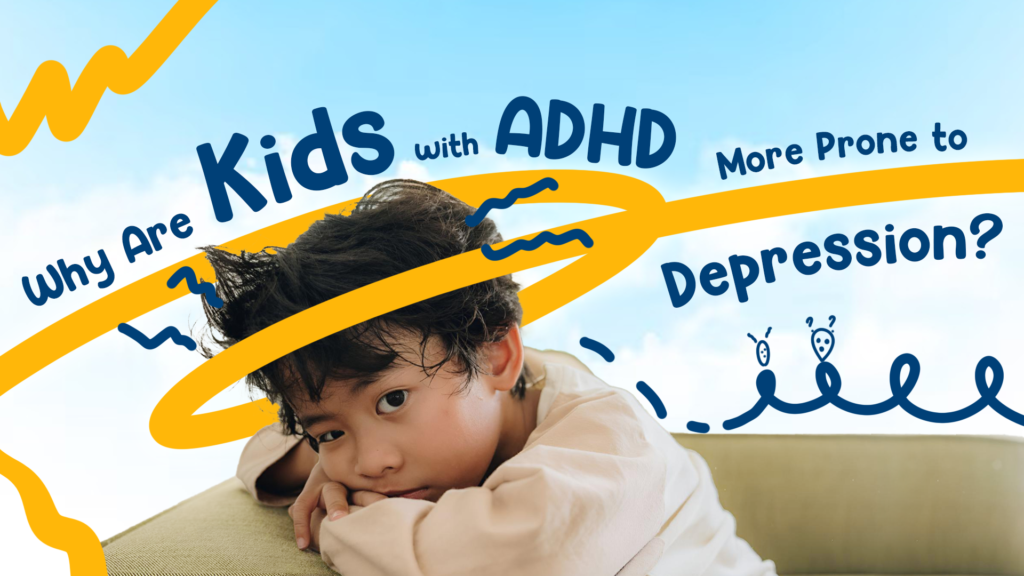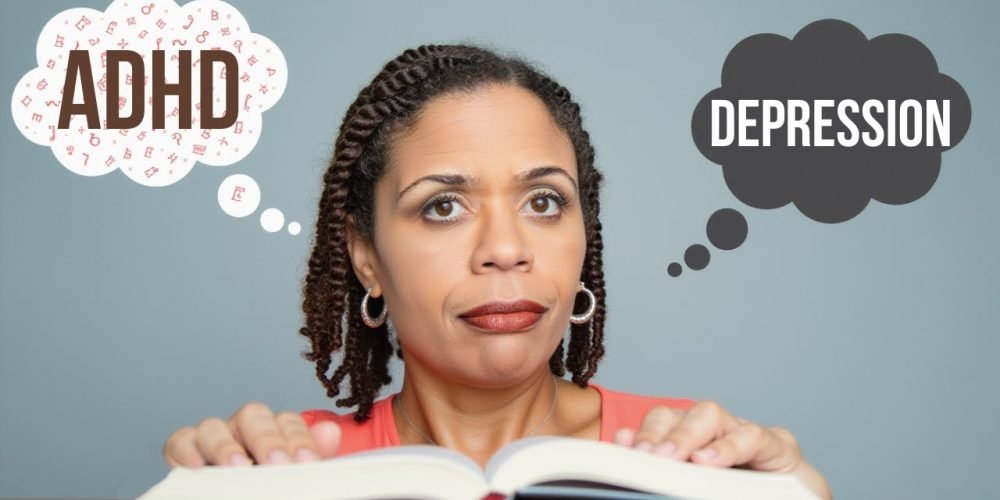Managing ADHD depression together can be a complex and challenging journey, but it is far from impossible. Attention Deficit Hyperactivity Disorder (ADHD) and depression often coexist, creating a unique blend of symptoms that can intensify the struggles of daily life. ADHD’s hallmark traits—such as difficulty focusing, impulsivity, and restlessness—can compound the feelings of sadness, hopelessness, and low energy associated with depression. This overlap not only impacts emotional well-being but also complicates the path to effective treatment.
In this comprehensive guide, we will explore the intricate relationship between ADHD and depression, offering insights into their shared mechanisms and strategies to manage both conditions effectively. Whether you’re someone living with these challenges or a caregiver seeking to provide support, this guide aims to equip you with practical tools and a deeper understanding to improve mental health and overall quality of life.
What Is the Connection Between ADHD and Depression?
The connection ADHD depression is both significant and complex, with research showing that individuals with ADHD are more likely to experience depression compared to the general population. This co-occurrence stems from several overlapping factors, including biological, psychological, and social influences.
From a biological perspective, both ADHD and depression involve dysregulation of neurotransmitters such as dopamine and serotonin, which play critical roles in mood regulation, motivation, and focus. This shared neurochemical imbalance may increase the likelihood of experiencing both conditions simultaneously.
On a psychological level, the daily struggles associated with ADHD—such as difficulty completing tasks, maintaining relationships, or achieving academic and career goals—can lead to feelings of frustration, low self-esteem, and hopelessness. Over time, these challenges may contribute to the development of depressive symptoms.
Social factors also play a role, as individuals with ADHD often face misunderstandings, criticism, and social isolation, which can further exacerbate feelings of sadness and despair. This combination of internal and external stressors creates a cycle where ADHD symptoms and depression feed into one another, making it difficult to break free without targeted interventions.
Understanding the connection between ADHD and depression is crucial for effective management, as treating one condition without addressing the other can lead to incomplete or temporary relief. A holistic approach that considers the interplay between these two conditions is key to fostering long-term mental health and well-being.

Understanding How ADHD Symptoms Can Trigger Depression
The symptoms of ADHD can create a ripple effect that significantly increases the risk of developing depression. Living with ADHD often means grappling with persistent challenges that affect various aspects of life, from personal relationships to academic and professional achievements. These struggles can gradually erode self-esteem and foster feelings of inadequacy, creating fertile ground for depression to take root.
Key ADHD symptoms such as impulsivity, inattention, and hyperactivity can lead to repeated failures in meeting personal goals or societal expectations. For instance, difficulty staying focused might result in missed deadlines or incomplete projects, while impulsivity can strain relationships due to misunderstandings or conflict. Over time, these patterns can lead to feelings of frustration, shame, and hopelessness, which are hallmark symptoms of depression.
Emotional dysregulation, a common but often overlooked aspect of ADHD, further contributes to the risk of depression. Individuals with ADHD may struggle to manage intense emotions, experiencing frequent bouts of anger, sadness, or anxiety. Without effective coping mechanisms, these emotional swings can lead to a sense of being overwhelmed or out of control, deepening feelings of despair.
Additionally, the stigma and misunderstanding surrounding ADHD can isolate individuals, making them feel unsupported or misunderstood. This lack of connection can exacerbate depressive symptoms, as social support is a crucial buffer against mental health challenges.
By recognizing how ADHD symptoms can trigger depression, individuals and caregivers can take proactive steps to address these issues. Seeking early intervention, building resilience through therapy, and fostering supportive environments can significantly reduce the likelihood of depression and improve overall quality of life.
ADHD Depression in Adults vs. Children: Key Differences
ADHD and depression present differently in adults and children, reflecting the unique challenges faced at various life stages. Understanding these differences is crucial for accurate diagnosis and effective treatment, as the interplay between ADHD and depression can significantly impact both age groups in distinct ways.
1. Symptom Presentation
In children, ADHD symptoms like hyperactivity and impulsivity are often more pronounced and easily observable. When combined with depression, children may show signs of irritability, excessive crying, or withdrawal from previously enjoyed activities. They might also struggle to express their emotions, making it challenging for caregivers to distinguish between ADHD-related frustration and depressive symptoms.
In adults, ADHD symptoms often shift toward inattention and executive functioning difficulties, such as disorganization or procrastination. When depression co-occurs, adults may experience chronic feelings of guilt, low self-worth, and a sense of being “stuck” in life. Their depressive symptoms may be masked by the stress and overwhelm associated with managing daily responsibilities.
2. Triggers and Challenges
For children, ADHD depression may stem from academic struggles, social rejection, or disciplinary issues. These experiences can lead to feelings of failure and isolation, increasing the risk of depression.
Adults, on the other hand, often face challenges such as career setbacks, strained relationships, and financial pressures. The cumulative impact of unmet goals or unresolved ADHD symptoms can create a sense of hopelessness, fueling depression.
3. Diagnosis and Awareness
Children are more likely to be identified with ADHD early, often through observations made by teachers or parents. However, depressive symptoms may go unnoticed or be attributed to behavioral problems. In contrast, adults with ADHD are frequently undiagnosed or misdiagnosed, with their symptoms mistaken for anxiety or mood disorders. When depression is present, it can overshadow ADHD, delaying proper treatment.
4. Treatment Approaches
In children, treatment for ADHD depression often involves behavioral therapy, school accommodations, and family support. Medication may be considered, but it is typically used cautiously and in conjunction with other interventions.
For adults, treatment focuses on a combination of medication, cognitive-behavioral therapy (CBT), and strategies to improve time management and organization. Addressing both ADHD and depression simultaneously is essential for meaningful progress.
5. Long-Term Impact
If left untreated, ADHD depression can have long-term consequences for both age groups. In children, it can lead to academic failure, social isolation, and difficulty transitioning into adulthood. For adults, it may result in chronic stress, relationship breakdowns, and reduced quality of life.
Recognizing the key differences in how ADHD depression manifests in adults and children is the first step toward providing targeted support and interventions. Tailored approaches can ensure that both groups receive the care they need to thrive.

Recognizing the Signs of ADHD Depression
Recognizing the signs of ADHD depression is essential for timely intervention and effective treatment. While ADHD and depression are distinct conditions, their symptoms often overlap, making it difficult to differentiate between the two. Understanding the unique signs of this combination can help individuals and caregivers take proactive steps toward managing both conditions.
Common Signs of ADHD Depression
- Persistent Feelings of Sadness or Hopelessness:
Individuals with ADHD depression may experience prolonged periods of sadness, feelings of worthlessness, or a lack of hope about the future. These emotions often stem from repeated struggles with ADHD symptoms and their impact on daily life. - Loss of Interest in Activities:
While ADHD can make it challenging to sustain interest in activities, depression amplifies this issue, leading to a complete loss of enjoyment in hobbies, relationships, or work. - Chronic Fatigue and Low Energy:
ADHD may cause bursts of hyperactivity, but when combined with depression, individuals often feel drained and unmotivated, struggling to complete even basic tasks. - Difficulty Concentrating Beyond ADHD Norms:
Although ADHD is characterized by inattention, depression can exacerbate concentration issues, leading to a mental fog that affects decision-making and memory. - Heightened Emotional Sensitivity:
Emotional dysregulation, common in ADHD Depression, becomes more pronounced with depression. Individuals may feel overwhelmed by guilt, shame, or frustration, often over seemingly minor incidents. - Irritability and Agitation:
Depression in individuals with ADHD may present as irritability or restlessness, which can be mistaken for typical ADHD behavior. However, this irritability is often accompanied by negative thoughts or feelings. - Changes in Sleep Patterns:
Sleep difficulties are common in ADHD, but depression can lead to extreme patterns, such as excessive sleeping or insomnia. These changes further disrupt energy levels and mood stability. - Appetite Changes:
Depression can cause significant changes in eating habits, including overeating or a loss of appetite, which may not be directly linked to ADHD behaviors.
Understanding the Overlap
The combination of ADHD and depression creates a unique set of challenges. ADHD’s impulsivity and disorganization can lead to repeated failures, while depression amplifies the emotional impact of these experiences. This cycle often leaves individuals feeling trapped, increasing the severity of both conditions.
Lifestyle Changes to Combat ADHD Depression
While professional treatment is often necessary for managing ADHD and depression, lifestyle changes can play a significant role in alleviating symptoms and improving overall well-being. These adjustments focus on creating structure, supporting brain health, and fostering emotional resilience. Here are some practical lifestyle changes to help combat ADHD depression:
1. Prioritize a Balanced Diet
Nutrition plays a vital role in brain function and mood regulation. Incorporate adhd diet rich in omega-3 fatty acids, such as salmon and walnuts, to support brain health. Complex carbohydrates like whole grains and vegetables can help stabilize energy levels and reduce mood swings. Avoid processed foods, excessive sugar, and caffeine, which can worsen ADHD and depressive symptoms.
2. Establish a Consistent Routine
Both ADHD and depression thrive on chaos and unpredictability. Create a daily schedule that includes designated times for work, meals, exercise, and relaxation. Consistency can help reduce overwhelm and provide a sense of control, which is particularly beneficial for those struggling with ADHD.
3. Incorporate Regular Exercise
Physical activity boosts endorphins, improves focus, and reduces stress—benefits that directly counteract both ADHD and depression. Aim for at least 30 minutes of moderate exercise daily, such as walking, cycling, or yoga. Activities that require coordination, like dancing or martial arts, are particularly effective for ADHD.
4. Practice Mindfulness and Meditation
Mindfulness exercises, such as deep breathing and meditation, can help calm racing thoughts and improve emotional regulation. These practices also promote self-awareness, making it easier to recognize triggers and patterns associated with ADHD depression.
5. Improve Sleep Hygiene
Sleep difficulties are common in individuals with ADHD depression, and poor rest exacerbates symptoms. Establish a relaxing bedtime routine, limit screen time before bed, and maintain a consistent sleep schedule. Creating a sleep-conducive environment with minimal distractions can also help.
6. Build a Support Network for ADHD Depression
Isolation can intensify feelings of depression. Surround yourself with supportive friends, family, or support groups who understand the challenges of ADHD and depression. Open communication about your struggles can reduce feelings of loneliness and foster a sense of belonging.
7. Limit Screen Time and Social Media
Excessive screen time, especially on social media, can worsen ADHD Depression symptoms and contribute to feelings of inadequacy or low self-esteem. Set boundaries for technology use and engage in offline activities that bring joy and relaxation.
8. Set Realistic Goals
Break tasks into smaller, manageable steps and celebrate small victories. Overambitious goals can lead to frustration and feelings of failure, which feed into both ADHD and depression. Focus on steady progress rather than perfection.
9. Engage in Creative Outlets
Creative activities such as painting, writing, or playing music can provide a healthy way to process emotions and improve focus. These hobbies offer a productive outlet for ADHD energy while countering depressive symptoms by fostering a sense of achievement.
10. Seek Therapy or Coaching
Lifestyle changes are most effective when paired with guidance from a professional. Cognitive-behavioral therapy (CBT) can address negative thought patterns, while ADHD coaches can help develop strategies for organization and time management.
By integrating these lifestyle changes into daily life, individuals with ADHD depression can experience significant improvements in mood, focus, and overall quality of life. Small, consistent efforts can lead to long-term benefits, paving the way for better mental health and emotional stability.
Check Our Adhd Planner Toolkit,
How to Support a Loved One Struggling with ADHD Depression
Supporting a loved one dealing with ADHD Depression requires empathy, patience, and understanding. The interplay between these two conditions can make daily life overwhelming, and your support can play a vital role in their journey toward better mental health. Here are some practical ways to help:
1. Educate Yourself About ADHD and Depression
Understanding the symptoms of ADHD Depression, challenges, and treatment options for ADHD and depression will equip you to provide better support. Recognize that ADHD’s impulsivity and disorganization, combined with the low energy and negativity of depression, can create unique difficulties for your loved one.
2. Listen Without Judging
Create a safe space where your loved one feels comfortable sharing their thoughts and feelings. Avoid offering unsolicited advice or minimizing their struggles. Instead, listen actively and acknowledge their emotions, letting them know they’re not alone.
3. Encourage Professional Help
Gently suggest seeking professional treatment, such as therapy or medication. Offer to help research options, schedule appointments, or accompany them if they feel nervous. A combination of therapy and medical intervention is often essential for managing ADHD depression effectively.
4. Assist with Organization and Routine
Individuals with ADHD often struggle with time management and organization, and depression can amplify these difficulties. Help them establish routines, set reminders, or break tasks into smaller, manageable steps. Avoid taking over entirely, as this might reduce their sense of independence.
5. Be Patient During Emotional Outbursts
Emotional dysregulation is common in ADHD, and depression can worsen feelings of frustration or sadness. During outbursts, remain calm and supportive. Offer reassurance and avoid reacting harshly, as this may escalate the situation.
6. Promote Healthy Habits
Encourage lifestyle changes that can improve symptoms, such as regular exercise, a balanced diet, and proper sleep. Invite your loved one to join you in activities like yoga, walks, or preparing healthy meals, making it a shared experience rather than a task they must do alone.
7. Avoid Criticism or Blame
It’s easy to feel frustrated when your loved one forgets commitments, struggles to focus, or appears unmotivated. However, criticism or blame can worsen feelings of inadequacy and contribute to their depressive symptoms. Focus on offering constructive solutions and positive reinforcement instead.
8. Foster Connection and Belonging
Social isolation is a common challenge for those with ADHD and depression. Encourage your loved one to connect with others by inviting them to social gatherings or introducing them to support groups. Building a network of understanding individuals can significantly improve their mental health.
9. Celebrate Small Victories
Acknowledge and celebrate their achievements, no matter how small they may seem. Whether it’s completing a task, attending therapy, or making it through a tough day, recognition can boost their self-esteem and motivation.
10. Take Care of Yourself
Supporting someone with ADHD depression can be emotionally taxing. Ensure you maintain your own well-being by setting boundaries, seeking support when needed, and practicing self-care. Being at your best allows you to offer better support to your loved one.
Your support, combined with professional care and a proactive approach, can make a profound difference in your loved one’s ability to manage ADHD depression and lead a fulfilling life.
For More Scientific Information About the ADHD depression Please Check this study.


